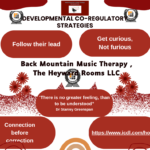Back Mountain Music Therapy, in its DIR (Developmental, Individual Differences, Relationship) believes highly, in the fact that although we are the therapists, the most influential people in our client’s lives, are the parents or the primary caretakers in our clients lives. Therefore, as we get to know both the client and the guardian that we… Read more »
Category: Strengths and Relationships Scope
CO-REGULATION

What is the difference between self regulation and compliance? A LOT! If your child is in therapy and this word is a goal, BEWARE! Compliance has to do with the needs of the person in charge. “Self-Regulation” has to do with the individual’s ability to calm themselves and be attentive. This is accomplished through “Co-regulation“…. Read more »
Following The Client’s Lead Day 5
Following the Client’s Lead, Day 4
Back Mountain Music Therapy main purpose in following the client’s lead with comunication is to support the client”s ability to assert their own agency. We feel that, rather than being told what to focus on following the clients lead adjusts the therapy to client’s level, for the purpose of social interaction and communication. Instead of… Read more »
Following the Client’s Lead, Day 3
Super tips to help you in “Following the Client’s Lead” As mentioned in some of the videos, following the client’s lead does involve following their interests, but it also involves a lot more. Here is a bullet list of things to look for in following the client’s lead: 2. Following their need for volume… Read more »
Following the Client’s Lead, Day 2
Following the Client’s lead is listening to their interests. These are the conditions that make them feel safe and secure. It means listening to where they are in their development and then supporting where they are at while also responding to them in order to give the client opportunities for growth. This happens best through… Read more »
Following the Client’s Lead, Day 1
Following the Client’s Lead is NOT just letting the client do what-ever they want, when-ever they want. It means listening to where the client is and what their interests are. It means looking beyond the surface of “behaviors” looking into the “why.” It means setting up circumstances so that the individual feels safe and is… Read more »
Behaviors, Clues to the REAL Issues
Behaviors are clues. No behavior exists “just because he doesnt feel like,” or “he just doesnt like….”, etc. Behaviors give us clues to what a childs weaker areas may be, areas that need support or development. If someone is shiveving, it is most likely that they are cold or possibly scared. Holding them down, rarely… Read more »

